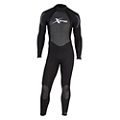 My wife, Lisa, and I have been heading to the Florida Keys for a decade to enjoy our annual vacations. After a few trips, we were able to make friends with many of the locals who have broadened my horizons on the diversity of the saltwater fishing and sporting opportunities in their backyards.
My wife, Lisa, and I have been heading to the Florida Keys for a decade to enjoy our annual vacations. After a few trips, we were able to make friends with many of the locals who have broadened my horizons on the diversity of the saltwater fishing and sporting opportunities in their backyards.
 My newly found friends were locals who grew up in the Keys and have extensive knowledge of the expansive waters surrounding the Keys and offshore waters. I wanted to know everything about those waters and the different methods used to catch as many species as possible. Every year, I would bring all the rods, reels, lures, and terminal tackle needed to pursue the fish. Having friends with the knowhow narrowed the time to do so. With several years under my belt, I became proficient at catching any species we went after.
My newly found friends were locals who grew up in the Keys and have extensive knowledge of the expansive waters surrounding the Keys and offshore waters. I wanted to know everything about those waters and the different methods used to catch as many species as possible. Every year, I would bring all the rods, reels, lures, and terminal tackle needed to pursue the fish. Having friends with the knowhow narrowed the time to do so. With several years under my belt, I became proficient at catching any species we went after.
A few years back, my buddy Paul introduced me to free diving with a multi-banded spear gun. My first year of diving, I was limited to only a few species due to the time of year. We concentrated on hog fish which are excellent table fare and were in the near-shore waters in depths of 15-25 feet. I quickly became proficient.
The following year, we based our trip around the opening of grouper season, one of my favorite aquatic meals. I was so enthused about the previous trip that I left my fishing gear home to concentrate on spear fishing.
We arrived the day before the opener so I could rent the full body wetsuit, fins, snorkel, and mask needed for my adventure. I borrowed a teak band gun from a friend. A gun of this nature is capable of taking large fish such as a black grouper that can exceed eighty pounds.
The gun itself sports a 3/8-inch diameter shaft which is sixty inches long with a single 4-inch collapsible barb. This underwater missile is powered by three 50-pound rubber bands and is very explosive when discharged. The prior season, I learned that hand/eye coordination is the key to aiming these guns. I found that deep penetration shots out to thirty feet are possible.
The next morning, I was a little apprehensive when we pulled out of the harbor at daybreak knowing we would be freediving waters out to 60 feet and deeper along the reef edge. My prior experience was in water less than half that depth, so we gradually worked our way to the deeper waters. I was surprised that it came naturally to me.

Free diving equipment is specialized to reach the depths with little effort. The wet suit cuts the water better than bare skin and protects you from stinging organisms, coral, and perhaps even the fish on the end of your spear. A correctly weighted, lead belt is necessary to make you neutral buoyant, which allows you to glide through the water without effort. The kick fins for deep water diving are five feet long and can propel you to depths of fifty feet in three slow kicks.
The key to being efficient is to spot the fish from the surface and make as little commotion as possible, relaxing on the surface and saving energy for the dive, then slowly following it until it’s comfortably resting or engaged in looking for its next meal. As soon as you position yourself with the right angle of pursuit, simply take a deep breath, bend your body so your rump is out of the water, point your gun, with both hands attached, at the fish, and direct your toes to the sky, straightening your legs. This simple motion will propel you toward the bottom.
Water pressure is a factor and blowing small amounts of air out of your nose will equalize it. Diving is a mental game that you must overcome, and you must be able to control your heart rate which conserves oxygen. After a few days, I was able to dive, pick my target, and pull off the shot without a problem. With so much pressure exerted on your body, you almost go into a euphoric state of mind.
The descent needs to be stealthy, with as little motion as possible avoid your quarry knowing you are there. The fact that you are approaching head first gives the fish a small profile which usually doesn’t alarm them. Also, if you rock your gun from side to side slowly, the barb on the spear will flap back and forth attracting the fish to you.
This feat may seem difficult or almost impossible, but, as you slowly rise to the surface after the shot, the oxygen in your lungs expands giving your body the extra oxygen needed to get to the surface.
If you’re a hunter, I highly recommend freediving to broaden your experience.
Dave Lee
Bass Pro Shops Field Staff
